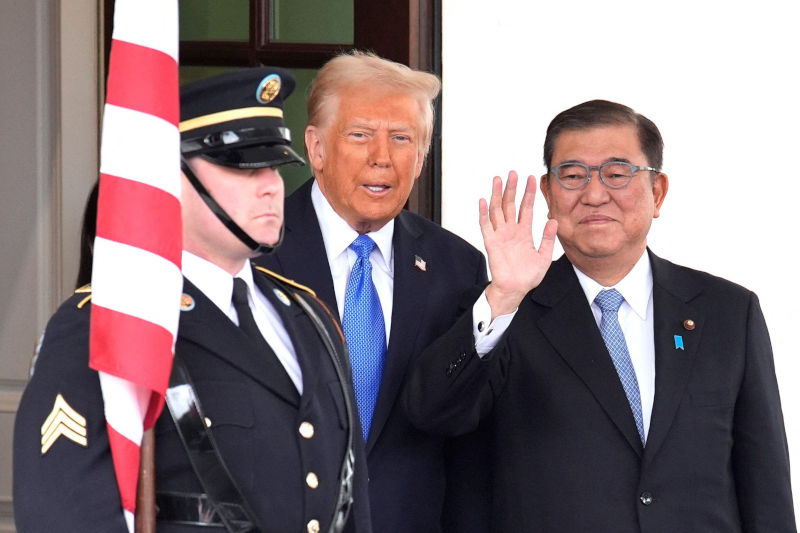Japan’s economic security strategy looks beyond the United States
June 27, 2025
In the face of increasingly uncertain global economic headwinds, Japan is redefining its economic security strategy.
While the US–Japan alliance remains a cornerstone, Tokyo is redoubling efforts to diversify its partnerships to mitigate the risks of over reliance on a single ally.
US-Japan relations in the era of Trump 2.0 are far from being business as usual. President Donald Trump has long complained about the US trade deficit with Japan. Tokyo has, meanwhile, hoped to limit the repercussions of US tariffs. Still, estimates show the tariffs are poised to heavily affect the Japanese economy in the long run, so much so that Japanese Prime Minister Shigeru Ishiba called US tariffs a “national crisis”.
The Trump administration has targeted US automotive imports – dominated by Mexico, Japan and South Korea. US tariffs have also undermined Japanese exports more broadly. Consequently, real GDP shrank at a greater-than-expected 0.2% in the first quarter of 2025.
Additionally, Trump’s trade war with China has placed Japan in a difficult position. Chinese Premier Li Qiang urged China and Japan to “fight protectionism together”. Japan has long maintained deep economic ties with China and the US. Yet, China is not a viable strategic partner due to Japan’s reliance on the US for security. Multilateral partnerships that do or may plausibly include China — like the Comprehensive and Progressive Agreement for Trans-Pacific Partnership and the Regional Comprehensive Economic Partnership — may inform Japanese decision-making. Balancing between the two will require a consistent long-term strategy.
Ishiba’s government operates without a solid majority following a significant election loss in 2024. This necessitates co-operation with opposition parties to advance the Liberal Democratic Party’s agenda.
This political reality underscores the importance of traditional security issues within Japan’s evolving economic security strategy. The Japanese government must prepare for a worst-case scenario. The US-Japan Security Treaty — guaranteeing the defence of Japan itself — could become part of the negotiation agenda. Ishiba faces the challenge of steering such international events amid a complex domestic political landscape following a significant election loss in November 2024.
Japan’s regional economic security strategy must consider the long-term fallout of the Trump 2.0 era. Japan’s Economic Security Promotion Act aims to revitalise the semiconductor and artificial intelligence sectors and reclaim technological leadership in the global chip industry. By diversifying its alliances and strengthening regional partnerships, Japan can move towards this goal of building economic resilience and maintaining stability amid shifting geopolitical dynamics. This strategic rebalancing could also cement Japan’s role as a pivotal player in promoting a stable order in the Indo–Pacific and beyond.
Japan’s outreach to countries beyond the US underscores its commitment to more diversified economic relationships. In January 2025, Ishiba visited Malaysia and Indonesia to bolster defence and economic ties. Discussions included enhancing security co-operation and establishing stable supply chains, with Japan exploring involvement in a rare earth processing plant in Malaysia.
In March 2025, Japan engaged in high-level talks on economic security with the UK. These discussions assessed shared concerns over global trade uncertainties and collaborative opportunities in technology and infrastructure.
Japan’s commitment to regional economic stability is further evident in its participation in the Supply Chain Resilience Initiative alongside India and Australia. This trilateral agreement seeks to reduce dependency on China by diversifying supply chains and promoting sustainable growth throughout the Indo-Pacific. Moreover, Japan has signed reciprocal access agreements with countries like Australia and the UK, facilitating joint military training and operations. Such measures to enhance defence capabilities and regional collaboration could become particularly relevant amid growing difficulties in US-Japan relations.
As the US intensifies its trade disputes with China and Europe, EU-Japan co-operation is strengthening to bolster the two countries’ resilience and reduce dependencies. In July 2023, the EU and Japan signed a Memorandum of Understanding to enhance co-operation in the semiconductor sector. This agreement aims to improve supply chain resilience, promote research and development for next-generation semiconductor technologies and establish an early warning mechanism to prevent disruptions in the supply chain.
Japan has actively pursued a range of bilateral security and defence agreements with various European states — including Norway and Italy — to enhance its strategic partnerships. The Japan–Italy Action Plan (2024–2027) confirms Japan’s commitment to work closely with Italy and the UK through the Global Combat Air Program, fostering Europe-Japan military co-operation.
As the EU’s willingness to strengthen its Indo-Pacific trade relations has become more apparent, Japan has reinforced its multilateral economic positioning towards Europe. The EU is not a member of CPTPP, but its existing trade agreements with nine of the CPTPP signatories provide a solid foundation for further engagement.
In an era of growing protectionism and intensifying geopolitical rivalry, traditional alliances and longstanding security and economic strategies are changing profoundly. As a country historically reliant on its partnership with the US, Japan is building a more resilient and autonomous strategic network of like-minded partnerships. These efforts may not signal a departure from the US alliance, but reflect a pragmatic and forward-looking response to a more fragmented and uncertain international environment.
Republished from East Asia Forum, 24 June 2025
The views expressed in this article may or may not reflect those of Pearls and Irritations.

